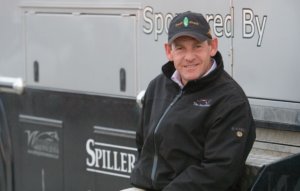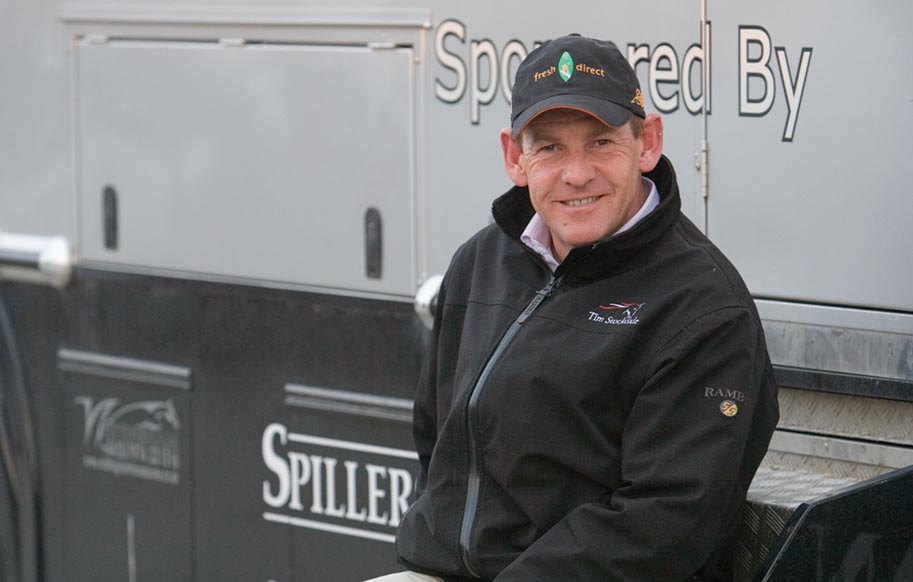 Tim Stockdale is as fed up with the weather as the rest of us. It’s the only time of the year he really appreciates his indoor school. “I don’t like the running costs of it,” he says, “but it does mean I can still work the horses.” And there is plenty of work to be done this spring with a nice collection of international show jumpers in an Olympic year, plus a yard full of useful youngsters to educate.
Tim Stockdale is as fed up with the weather as the rest of us. It’s the only time of the year he really appreciates his indoor school. “I don’t like the running costs of it,” he says, “but it does mean I can still work the horses.” And there is plenty of work to be done this spring with a nice collection of international show jumpers in an Olympic year, plus a yard full of useful youngsters to educate.
Tim’s latest ride, the grey mare Lou Lou, had a good showing at the London International at Olympia, and was placed in four out of five classes, but this year Tim will be concentrating on his number one, Fresh Direct Corlato and Olympic selection.
“The Games are my true focus this year and it will be a very strange year for us. Under normal circumstances I would be looking at having a very full year, but for Corlato it will be more about quality. Less shows and lots of preparation”, explains Tim who hopes to get the nod for the team when the selectors make their decision on June 22nd.
The climate in Hong Kong, where the equestrian events will be held, is not ideal for horses. The British team will travel in the first week of August and jump on the 15th. “We have to keep mentally sharp, explains Tim. “If we are there for six weeks, with only one horse to focus on, there is a temptation to do too much and risk the horse becoming sour. The Hong Kong event will be run at night and our horses will need to be used to the shadows cast by the lights, so we will practice that. It will be very hot and humid and the conditions will be very testing.”
 The feeding and stable management of competition horses is also critical. “We feed our horses twice a day, with just a snack at lunchtime,” says Tim. “We do it this way because often we are away at shows and competing at a time when the horses would expect to be fed and then they don’t concentrate. I don’t like feeding course mixes, although Corlato has a racehorse mix as she doesn’t like a high-oat based feed. We feed bran, nuts, sugar beet and oats and add supplements where necessary. All our horses are blood tested regularly. How do you know what is normal if you only do a test when the horse is under performing? We do it every three months so that we build up a dossier to look back on for each horse and from that we can see abnormalities. Our physiotherapist visits our yard every two weeks and over a six week period she will have checked every horse and knows what is normal and what is not. All our horses also have a dental check every six months too!”
The feeding and stable management of competition horses is also critical. “We feed our horses twice a day, with just a snack at lunchtime,” says Tim. “We do it this way because often we are away at shows and competing at a time when the horses would expect to be fed and then they don’t concentrate. I don’t like feeding course mixes, although Corlato has a racehorse mix as she doesn’t like a high-oat based feed. We feed bran, nuts, sugar beet and oats and add supplements where necessary. All our horses are blood tested regularly. How do you know what is normal if you only do a test when the horse is under performing? We do it every three months so that we build up a dossier to look back on for each horse and from that we can see abnormalities. Our physiotherapist visits our yard every two weeks and over a six week period she will have checked every horse and knows what is normal and what is not. All our horses also have a dental check every six months too!”
 Happy horses clearly make good competition horses and Tim’s horses look over their stable doors into a garden with trees. “They can all see each other and have mirrors to keep them company. I’m very pleased with my stables, which are large, light and airy,” says Tim. “I designed them myself and they have a 12-foot overhang made of clear Perspex with a UV filter, so our horses get the best of both worlds.”
Happy horses clearly make good competition horses and Tim’s horses look over their stable doors into a garden with trees. “They can all see each other and have mirrors to keep them company. I’m very pleased with my stables, which are large, light and airy,” says Tim. “I designed them myself and they have a 12-foot overhang made of clear Perspex with a UV filter, so our horses get the best of both worlds.”
Later this month, Tim will be in France competing in the Grands Prix in Nantes and Bordeaux – both of which he won last year – before going on to compete at Vigo in Galicia, south-west Spain. The horses will then have a short break before preparing for the outdoor season which starts in late April. Royal Windsor will be one of Tim’s first big outdoor shows this year.



